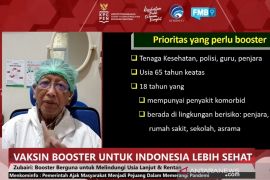"So far, people have only focused on the types of food and drinks consumed and their effects on health, but have ignored the effect of the food or beverage packaging and the content in the packaging on health," Secretary General of IDI, Ulul Albab, said in a written statement received here on Friday.
Data from the Ministry of Industry has shown that around 78 percent of industries in Indonesia are currently using plastic packaging for food and beverage products, while 16.5 percent are using plastic for packaging carbonated drinks.
Albab said that all parties need to implement a new plastic economy vision, in accordance with the recommendations of the United Nations Environment Programme (UNEP).
The recommendations include eliminating the unnecessary use of plastic, innovating to ensure plastic can be reused, as well as circulating used plastic items so that they remain maintained, economical, and environmentally friendly.
As a form of support from IDI, he suggested that every industry label food or beverages to show whether or not their packaging contains BPA.
It is also advisable for manufacturers and industry players to consult with BPOM regarding the content and labeling regulations because they are related to public safety and health, including being wise in producing and choosing plastic packaging.
Meanwhile, the community must avoid using, storing, or washing plastic bottles repeatedly at high temperatures, Albab said.
"Then, choose plastic packaging with a BPA-free label, including bottled drinking water," he added.
Head of PB IDI's non-communicable disease management study division, Agustina Puspitasari, said that globally, BPA is widely used in products such as reusable water bottles, polycarbonate plastics, packaging plastics, food can coatings, and water pipes.
Several studies have shown that exposure to BPA affects human physiology controlled by the endocrine, prostate gland, and brain development in fetuses, infants, and children. As a result, the use of plastic containing BPA can affect children's health and behavior.
Related news: Poor distribution of reusable water gallons aggravates BPA migration
Related news: BPA labeling on drinking water gallons not impacting depots' sales
Related news: Minister encourages regulations to reduce plastic waste in Raja Ampat
Translator: Hreeloita Dharma, Raka Adji
Editor: Sri Haryati
Copyright © ANTARA 2022











